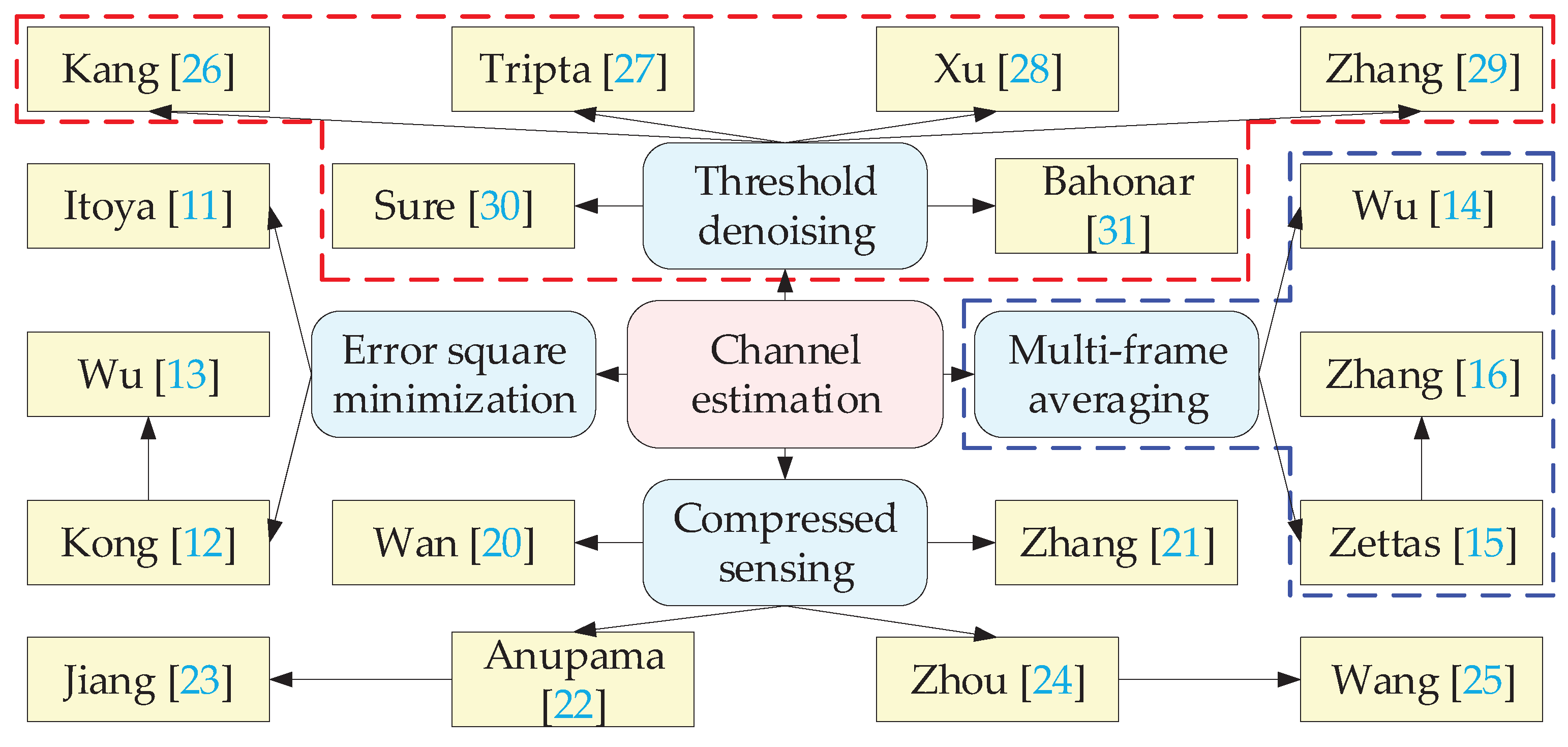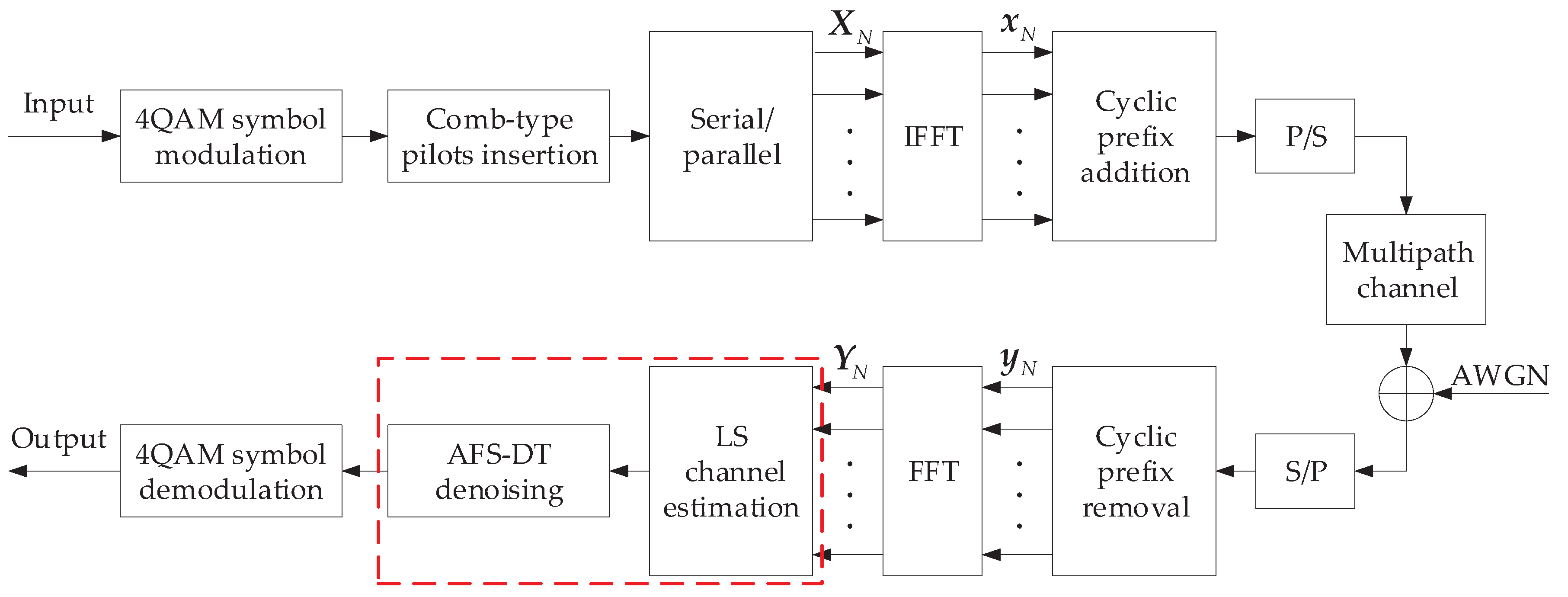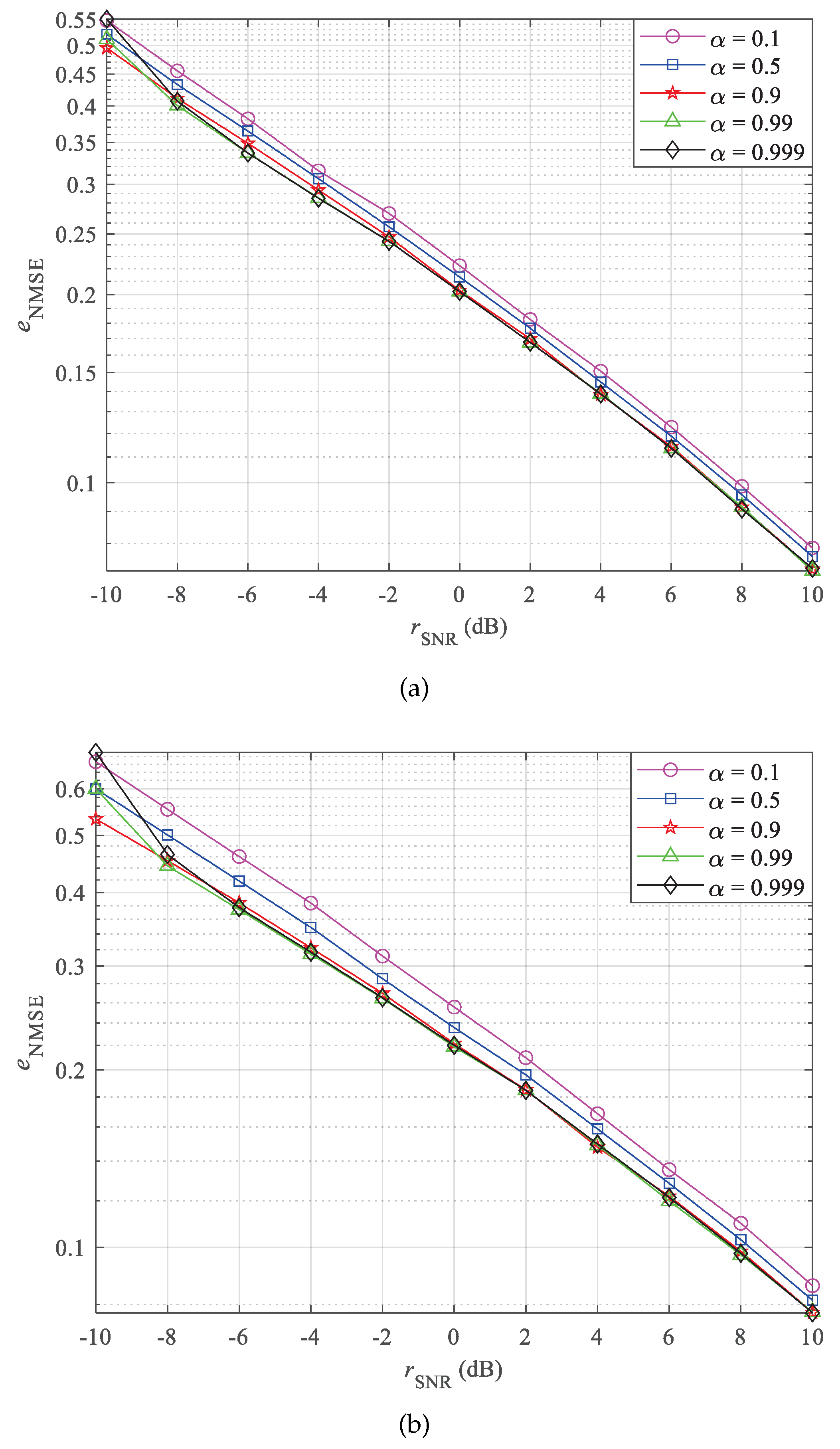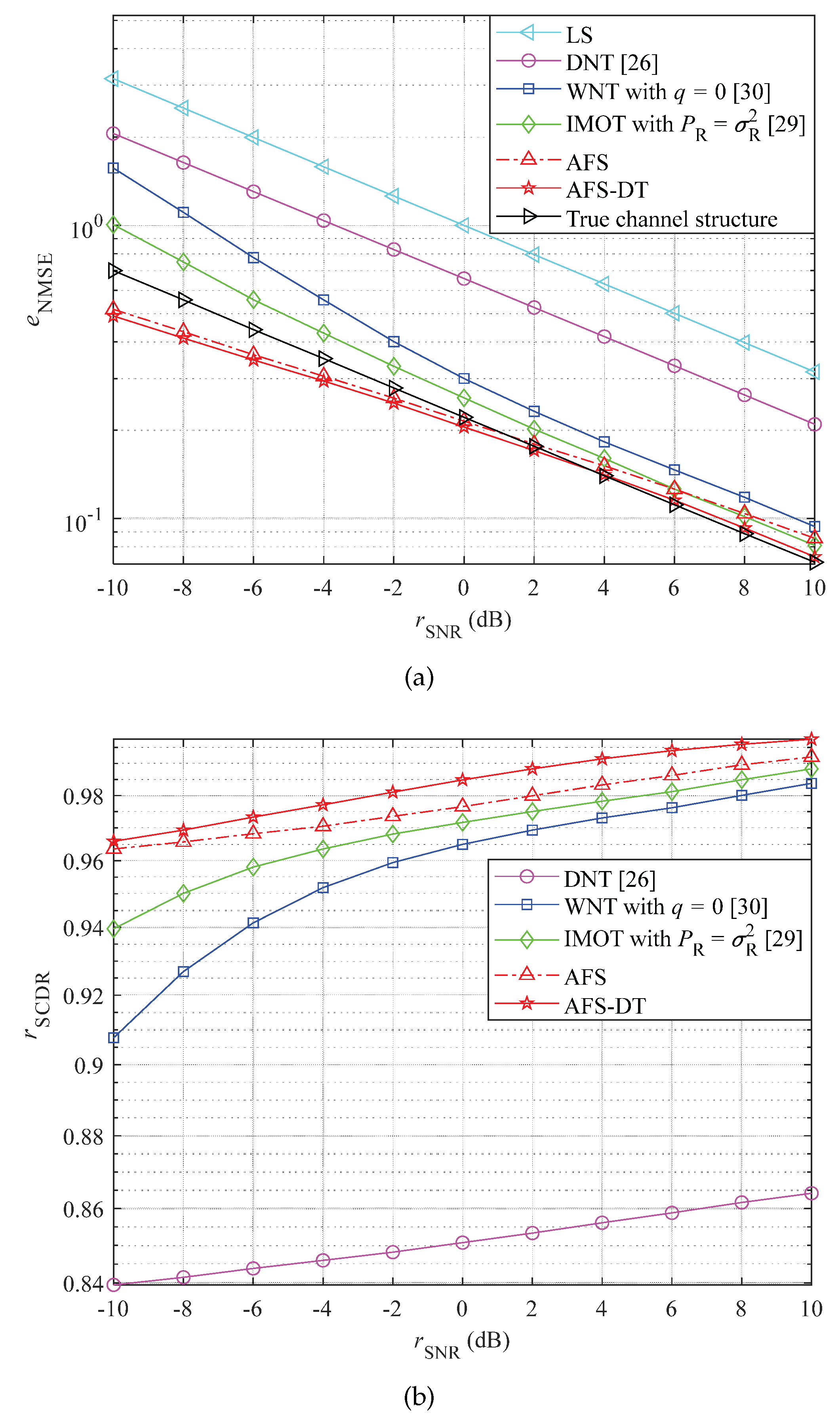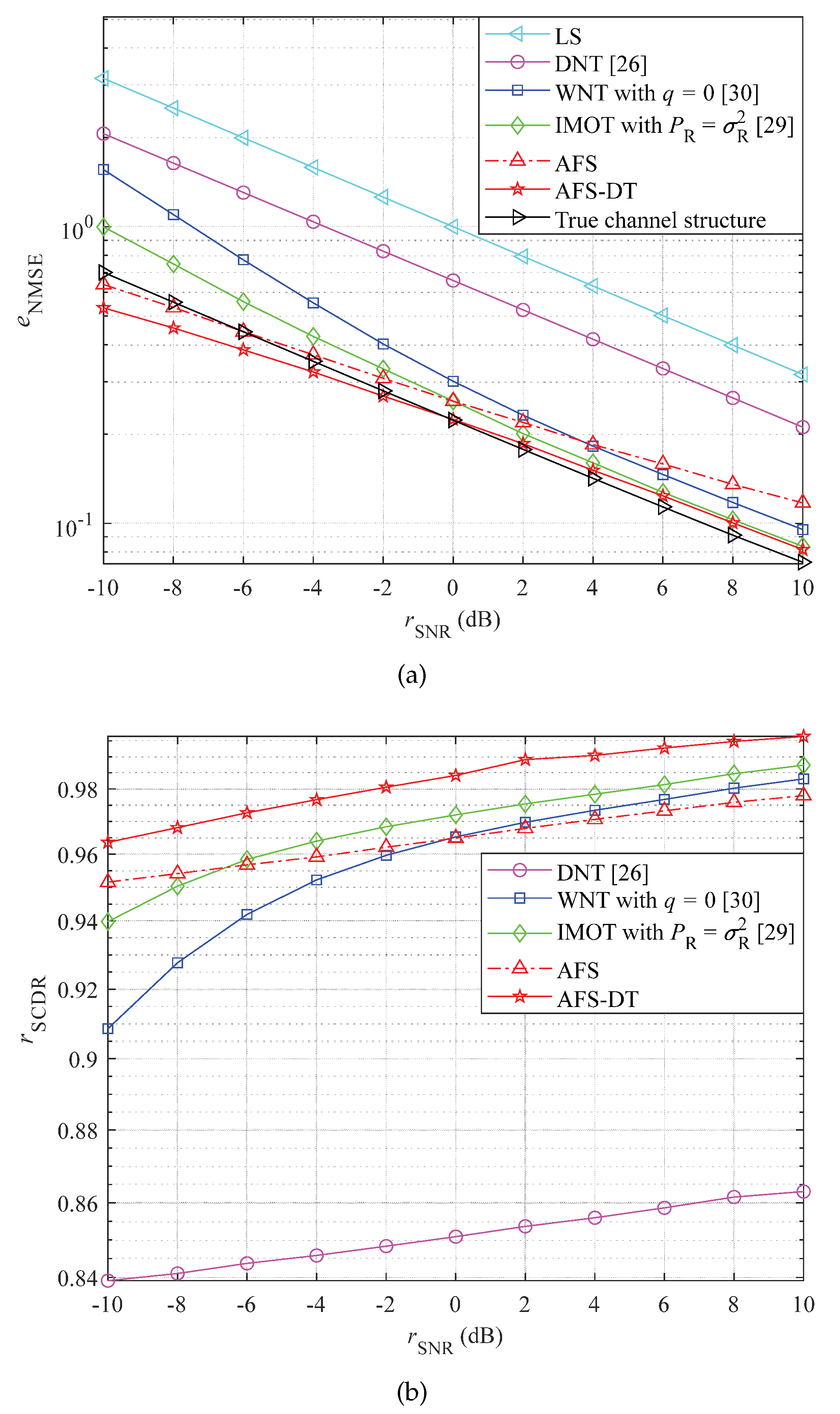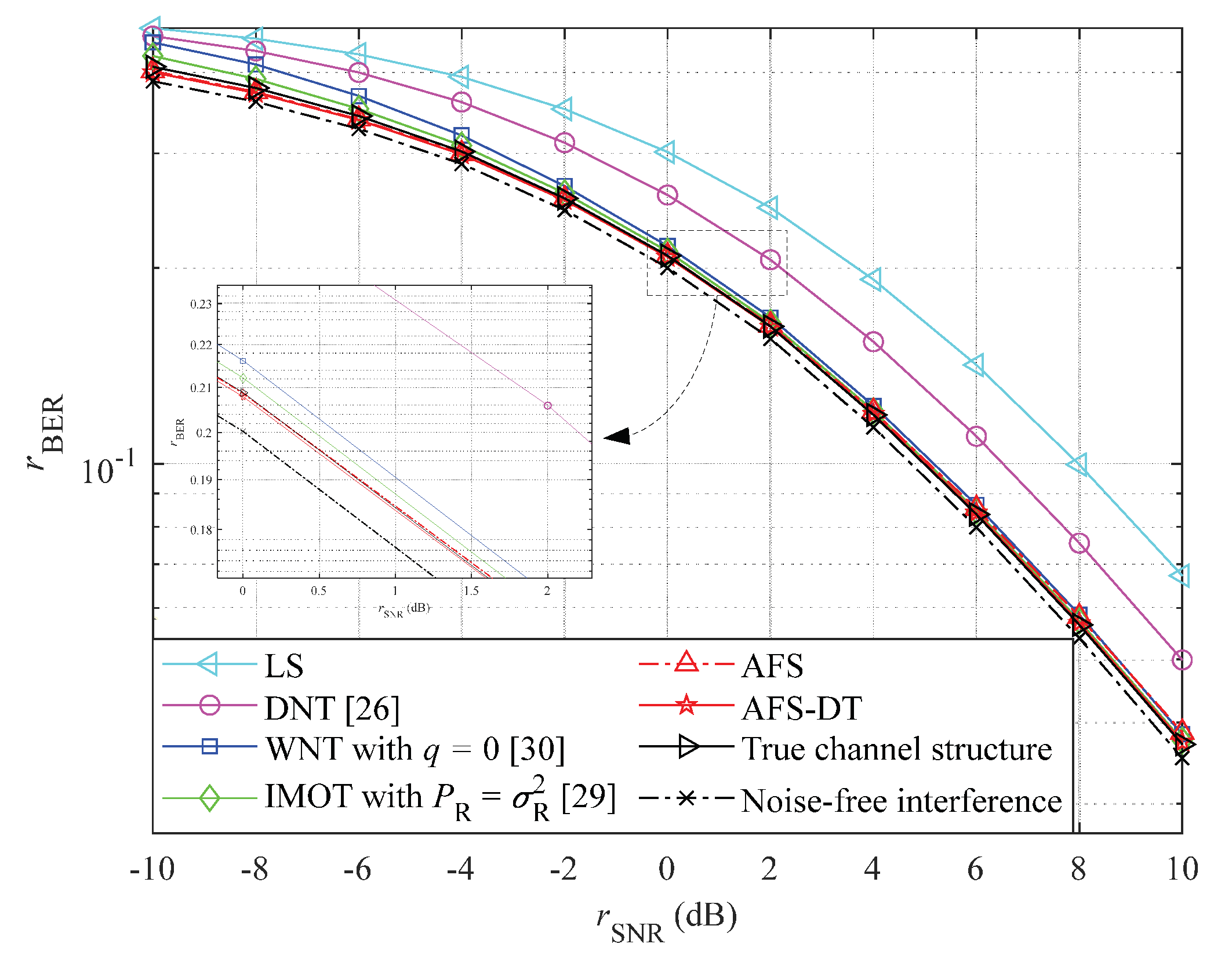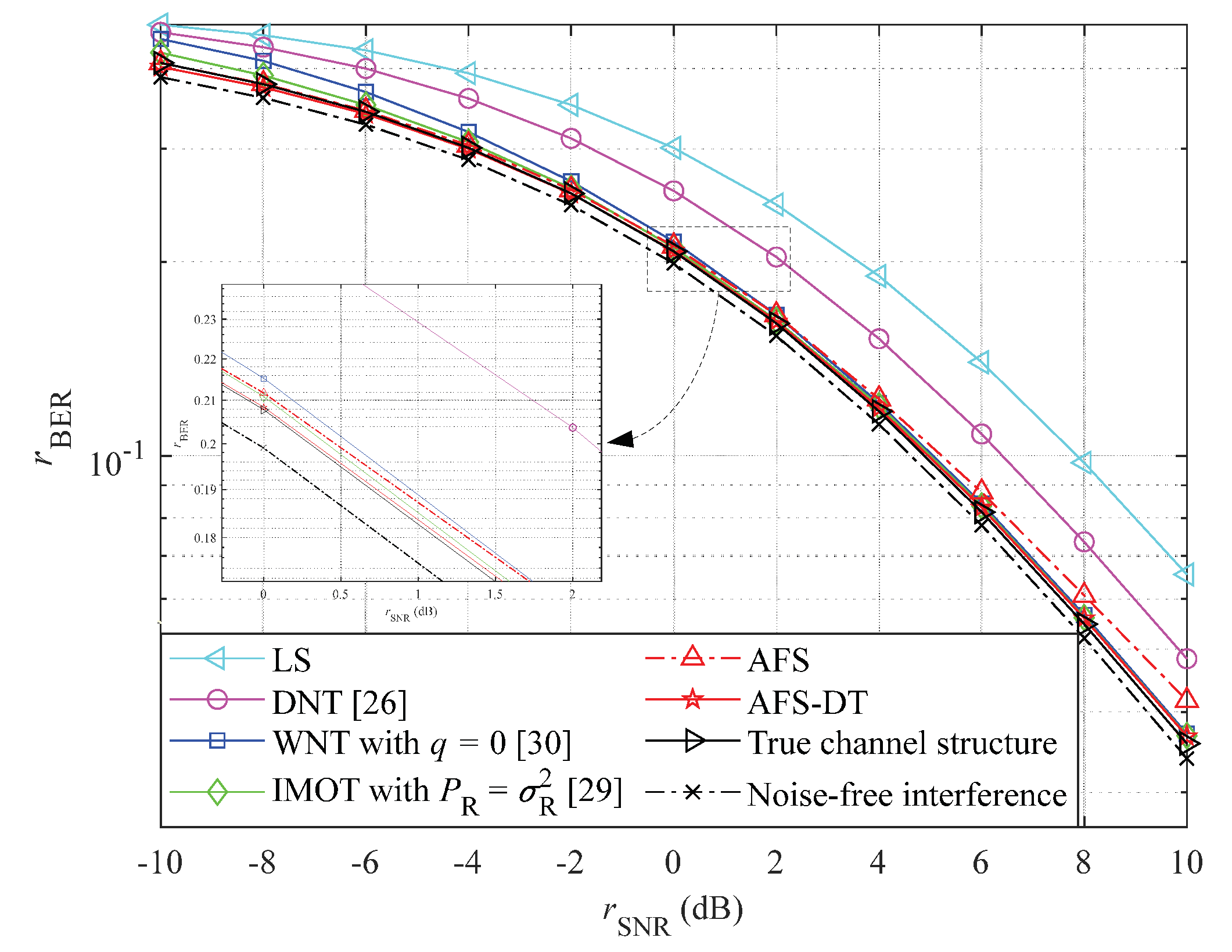1. Introduction
Orthogonal frequency division multiplexing (OFDM) technology is extensively employed in modern communication systems due to its exceptional performance and high spectral efficiency [
1,
2]. By inserting a cyclic prefix (CP) which is greater than the maximum delay extension of the multipath channel among adjacent OFDM symbols as the guard interval (GI), it not only eliminates inter-symbol interference (ISI) but also greatly simplifies the design of the frequency domain equalizer [
3]. To recover the signals accurately at the receiver, channel estimation is essential. The current channel estimation methods for OFDM systems can be divided into three categories: blind channel estimation [
4], semi-blind channel estimation [
5], and pilot-based channel estimation [
6]. Although blind and semi-blind channel estimation methods have higher spectral efficiency, their high computational complexity is not ideal in practical applications. The pilot-based channel estimation methods are often preferred due to their reliability and simplicity. Usually the pilots are inserted in block-type [
7], comb-type [
8], or scatter-type [
9]. In the block-type arrangement, the pilots appear in a few OFDM symbols of all subcarriers. In the comb-type arrangement, the pilots appear in a few subcarriers of all OFDM symbols. In the scatter-type arrangement, the pilots appear in a few subcarriers of a few OFDM symbols. Therefore, the number of pilots in the scatter-type is less than that in the block-type and comb-type. However, the comb-type pilots can better recover the channel state information (CSI) in time-varying channels [
10]. Therefore, this paper focuses on the channel estimation techniques based on comb-type pilots.
Figure 1 gives the mainstream channel estimation methods based on comb-type pilots in OFDM systems, which are error square minimization, multi-frame averaging, compressed sensing (CS), and threshold denoising. The threshold denoising methods in the red dashed box and the multi-frame averaging methods in the blue dashed box in the figure are the theoretical sources of the proposed method in this paper.
At the receiver, the channel is estimated using the known and received pilots. There are many conventional channel estimation techniques such as least square (LS) method [
11], minimum mean square error (MMSE) method [
12], and linear MMSE (LMMSE) method [
13]. The LS method is the simplest channel estimation method and has been widely used for many years. However, it ignores the effect of noise, which reduces its channel estimation accuracy greatly. The MMSE method uses priori knowledge in the form of second-order statistics of the channel and has better estimation performance, but it involves matrix inverse operations and has high computational complexity. The LMMSE method is a simplification of the MMSE method. Although it reduces the computational complexity, it still requires prior channel knowledge to calculate the autocorrelation matrix of the channel. The LS-based channel estimator is simple to implement and does not require prior knowledge of the channel. To enhance its performance, numerous denoising strategies have been proposed in existing literatures. Wu et al. [
14] proposed a weighted averaging channel estimation method according to the temporal correlation of wireless channels. Based on the LS estimation, the channel coefficients of two adjacent OFDM symbols are weighted averaged. The noise is better suppressed under this method, but it is not effective in dynamic channels. Zettas et al. [
15] adaptively adjusted the buffer according to the Doppler shift, and thus the average number of OFDM frames is determined to adapt to dynamic channels. Based on this, Zhang et al. [
16] considered the effect of signal-to-noise ratio (SNR) on the average number of OFDM frames and proposed a more reasonable multi-frame weighted averaging scheme. However, the multi-frame averaging technique causes Doppler distortion in dynamic channels. In fast time-varying channel environments, the performance loss from multi-frame averaging could be higher than the performance gain of noise suppression. Therefore, the methods proposed by Zettas et al. [
15] and Zhang et al. [
16] still have some limitations.
For some bandwidth wireless channels, the channel impulse response (CIR) often exhibits a sparse structure due to delay differences and relatively high sampling rates. CS algorithms have been successfully applied to the recovery of sparse channel support sets. They are mainly classified into convex optimization [
17] and greedy optimization [
18]. Convex optimization mainly uses basis pursuit (BP) [
19] to solve the parametric minimization problem. Its reconstruction accuracy for sparse channel is high, but it is not applicable to real-time systems and has high complexity. In contrast to convex optimization which sets the objective function to minimize, greedy optimization determines the location of the non-zero sampling points of the sparse channel by multiple iterations. Orthogonal matching pursuit (OMP) [
20], block OMP (BOMP) [
21], and compressive sampling matching pursuit (CoSaMP) [
22] are the most commonly used CS algorithms. Jiang et al. [
23] proposed a separable CoSaMP (SCoSaMP) algorithm based on the introduction of backtracking idea. It effectively improves the channel estimation accuracy while reducing the complexity. For some scenarios where the channels satisfy the joint sparse model (JSM), simultaneous OMP (SOMP) [
24] algorithm effectively utilizes the joint sparse property to obtain a better sparse channel reconstruction performance. Based on this, Wang et al. [
25] proposed an improved SOMP algorithm to achieve ordinary channel taps detection and dynamic channel taps pursuit. Its channel recovery performance is significantly improved under the sparse channel model with the same partial support sets. However, the above CS algorithms [
20,
21,
22,
23,
24,
25] usually require a large number of iterations to reduce the approximation error, which brings high complexity. Moreover, channel estimation methods based on CS algorithms require known number of channel common support sets to achieve optimal performance, which limits their scope of application.
Threshold-based channel estimation methods have lower complexity than those based on CS algorithms and mostly do not require known number of channel common support sets. They typically use the LS method to obtain the initial CIR. Then, the amplitude of each sample point is compared with a given threshold to determine the multipath sample points. The performance of channel CIR support sets recovery depends heavily on the setting of detection thresholds. Most conventional spectrum sensing methods use a fixed threshold to distinguish the multipath and noise sampling points. For example, Kang et al. [
26] proposed a double noise variance threshold (DNT) by calculating the noise variance from sampling points outside the CP. Tripta et al. [
27] implemented the estimation of noise standard deviation by wavelet decomposition and set it directly as the threshold. However, it is difficult to guarantee the noise removal rate by using a fixed threshold. Its performance degrades faster, especially when the noise power fluctuates. Xu et al. [
28] proposed a piecewise suboptimal threshold (PSOT) for selecting the most significant samples (MSSs) in the estimated CIR. This threshold is set by setting the first-order derivative of the mean square error (MSE) to zero to filter out the possible noise samples in the MSSs as much as possible. Zhang et al. [
29] proposed a channel estimation method based on the combination of adaptive multi-frame averaging and improved MSE optimal threshold (IMOT). In this method, most of the noise is suppressed without significantly increasing the computational complexity. To obtain a more desirable performance, both PSOT and IMOT require priori channel sparsity for assistance, which is often difficult to obtain in practice. In a completely unknown channel environment, Sure et al. [
30] proposed a weighted noise threshold (WNT) by introducing a modified interpretation of the hypothesis testing problem. To some extent, the MSE degradation problem caused by the estimation of priori channel information is overcome. Bahonar et al. [
31] proposed a sparse recovery method based on sparse domain smoothing. It is mainly divided into three parts: time domain residue computation, sparsity domain smoothing, and adaptive thresholding sparsifying. Its performance of channel recovery is improved considerably at the expense of certain complexity. However, the performance of existing threshold denoising methods is often unsatisfactory in low SNR range. The reason is that regardless of how the threshold is selected in low SNR range, there is the problem of misclassification of multipath sampling points with lower energy and noise sampling points with higher energy.
To improve the accuracy of channel estimation in fast time-varying channels and ensure computational complexity, this paper proposes a double-threshold (DT) estimation channel method based on adaptive frame statistics (AFS) by utilizing the sparsity and temporal correlation of wireless channels. Its performance in terms of normalized mean square error (NMSE), channel structure correctness detection rate (SCDR), and bit error rate (BER) is better than many existing threshold denoising methods in low SNR range. The main novelties and contributions are as follows:
- (1)
The temporal correlation of the received signals is used to analyze the time-varying characteristics of the channel, so that the number of OFDM statistical frames can be determined adaptively.
- (2)
The channel estimation accuracy is further improved by designing the DT based on the preliminary detection results combined with the distribution characteristics of the sampling points.
- (3)
To fully utilize the cache resources and improve the performance of DT, a multi-frame averaging technique is used to expand the distinction between multipath and noise sampling points after the preliminary statistics.
The rest of this paper is organized as follows.
Section 2 presents the system model.
Section 3 derives the proposed AFS-DT channel estimation method in detail. Experimental results of the proposed method and other conventional methods are given in
Section 4, and the computational complexity of the different methods is compared and analyzed.
Section 5 summarizes the research work.
2. System Model
It is supposed that one OFDM symbol is transmitted in one frame in this paper.
Figure 2 shows the CP-OFDM system model using the proposed AFS-DT channel estimation method. The main research work of this paper is shown in the red dashed box in the figure. At the transmitter, the input binary bits are grouped and mapped by 4-quadrature amplitude modulation (4QAM). After inserting the comb-type pilots with uniform interval and length
, a serial to parallel (S/P) transformation is performed. The inverse fast Fourier transform (IFFT) block converts the data with
N rows into the time-domain signals, where
N is the number of subcarriers. Then, the CP of length
is added to the time-domain OFDM symbols, which should be larger than the maximum channel delay extension
L (in terms of samples) [
32]. The transmitted signals will pass through the multipath fading channel with additive white Gaussian noise (AWGN) after parallel to serial (P/S) transformation.
At the receiver, it is assumed to be perfectly synchronized with the transmitter. The CP is removed after the S/P transformation. The fast Fourier transform (FFT) output of the pilot symbols is expressed as:
where
and
represent the received and transmitted pilot of the
mth
subcarrier in the
kth
OFDM symbol, respectively.
is the true channel frequency response (CFR), and
represents AWGN.
The channel estimation module uses the LS method to obtain the CFR
, which can be expressed as:
The CFR
is transformed to the time domain by the
-point IFFT. Considering the sparsity of the wireless channels, the CIR
can be specifically expressed as:
where
is the true CIR support sets, which can be considered as the position of the multipath sampling points in interval sampling channels.
is the true CIR at the multipath sampling points, which can be modeled as a complex Gaussian random variable with mean 0 and variance
in Rayleigh fading channels.
is the complex AWGN with mean 0 and variance
. Since
and
are independent of each other,
also conforms to the complex Gaussian distribution. Therefore, the random variable
is distributed as:
Since AWGN is ignored in the LS method, the channel estimation accuracy will be further improved in the AFS-DT denoising module, which will be described in detail in
Section 3. Finally, the transmitted binary bits are obtained by the 4QAM demodulation method.
3. The Proposed Method
The existing threshold denoising methods have limitations in low SNR range. Therefore, an AFS-DT based channel estimation method is proposed in this paper. First, the channel structure is preliminarily determined by multi-frame statistics based on the distribution characteristics of multipath sampling points and noise sampling points. The number of statistical frames
P is determined adaptively according to the temporal correlation of the received signals, and the derivation process will be described in detail in
Section 3.2. A multi-frame averaging technique is then used to expand the distinction between multipath and noise sampling points. Finally, a cost factor is introduced to design a denoising threshold that minimizes the overall error cost, and another threshold is introduced to supplement multipath.
Perform
P-frame statistics on the CIR
obtained by LS estimation. Let the number of times the real part of the
mth sampling point appears in the statistical intervals
and
be
and
, respectively. Similarly, let the number of times the imaginary part of the
mth sampling point appears in the statistical intervals
and
be
and
, respectively. The counting process can be specifically expressed as [
33]:
where
denotes the operation of counting.
and
denote the operations of taking the real and imaginary parts, respectively.
Next, define the variable
:
where
denotes the operation of taking the maximum value.
In the time-varying channels, there exists a certain degree of correlation among adjacent OFDM symbols. Since the probability density function (PDF) of noise conforms to the zero-mean complex Gaussian distribution, it is known from the statistical properties of noise that if the
mth sampling point is a pure noise sampling point, the number of times its real or imaginary part appears in the intervals
and
is similar. It can be considered that
. In practical communication environments, the power of multipath in the channel is much greater than the power of noise. Considering the correlation among adjacent OFDM frames, if the
mth point is a multipath sampling point, the number of times its real or imaginary part appears in the statistical intervals
and
approximates the number of statistical frames, i.e.
. Therefore, the preliminary channel structure detection matrix
can be expressed as:
where the value of 1 represents a multipath sampling point, and the value of 0 represents a noise sampling point.
Due to the extreme randomness of statistics and the time-varying nature of the channel, there are still misclassifications of noise as multipath and multipath as noise. Therefore, further optimization is needed.
P-frame averaging of the CIR can be expressed as:
The channel information of adjacent OFDM frames is still similar due to the temporal correlation of the channel. It can be considered that
. That is, the true multipath power
after averaging is approximately equal to the unaveraged true multipath power
. The multipath power after superimposed noise becomes
, and the noise power is
. Therefore, the CIR
after averaging conforms to the following complex Gaussian distribution:
Combining (
4) and (
12), the change in the distinction between multipath sampling points and noise sampling points can be specifically expressed as:
It can be seen that by averaging the adjacent P-frame OFDM symbols, the distinction in energy between multipath sampling points and noise sampling points is approximately expanded by a factor of P. Unlike the purpose of conventional multi-frame averaging, it is not directly used to average the CIR for noise suppression. This is because multi-frame averaging in dynamic channels distorts the channel coefficients at the multipath sampling points, which means that is not rigorous and even causes errors.
The square of the envelope of the CIR
after averaging gives
, which represents the power and follows an exponential distribution. The cumulative distribution functions (CDF)
and
of multipath power and noise power can be specifically expressed as:
When the power at the
mth subcarrier in the
kth OFDM frame is less than the denoising threshold
, it is considered as a noise sampling point, and vice versa as a multipath sampling point. According to the nature of the CDF, when
, the multipath error removal probability is
and the noise correct removal probability is
. Therefore, the probabilities of missed alarm (MA) and false alarm (FA) are
and
, respectively. The overall error cost
can be expressed as:
where
is the introduced FA cost factor, the specific value of which will be given in
Section 4.2. To obtain the optimal denoising threshold, the first order derivative of
for the overall error cost
can be expressed as:
Let the first order derivative be equal to zero, and the denoising threshold
for finding the minimum error cost can be specified as:
Since the multipath power
is usually much larger than the noise power
, the essence of this denoising threshold
is multiple of the noise power corresponding to the
kth frame. Based on this, the threshold
for supplementing multipath can be expressed as:
The preliminary channel structure detection matrix
is further optimized with the denoising threshold
and the supplementary multipath threshold
. Searching for possible noise sampling points among the originally judged multipath sampling points, the selection principle is less than the denoising threshold set in the current frame. Searching for possible multipath sampling points among the originally judged noise sampling points, the selection principle is greater than the supplementary multipath threshold set in the current frame. The final channel structure detection matrix
can be specifically expressed as:
where
and
are the CIRs of multipath and noise after preliminary detection, respectively.
Based on the final channel structure detection matrix
for time-domain denoising, the final CIR
can be expressed as:
3.1. Estimation of Multipath Power and Noise Power
From (
18) and (
19), the optimal threshold requires known multipath power
and noise power
. Next, the
and
will be estimated based on the preliminary detection results.
The CIR
at all multipath sampling points is obtained from the CIR
and the preliminary channel structure detection matrix
, which is expressed as:
Based on the CIR
with multipath energy only, the average multipath power of the
kth OFDM frame is calculated, which can be expressed as:
where
denotes summation by column.
The CIR
at all noise sampling points is obtained from the CIR
and the preliminary channel structure detection matrix
, which is expressed as:
where
denotes an all-one matrix with the same dimension as
. The noise power of the
kth OFDM frame can be expressed as:
where
denotes the operation of taking the median by column.
3.2. Determination of P
For an OFDM system with a baseband bandwidth of
B, let the duration of a time-domain OFDM symbol (containing CP) be
, which is specified as:
Assuming the number of frames for frame statistics is
P, the duration of
P-frame OFDM symbols can be expressed as:
To ensure the reliability of preliminary statistical results, there should be a strong correlation among the OFDM frames used for statistics. That is, the channel has a small variation in the duration
. Therefore,
should be smaller than the coherence time
of the channel, i.e.:
where
is the buffer factor and the value is greater than 1, and it is selected as
for the proposed AFS-DT method. Meanwhile, the coherence time
of the channel can be defined as [
34]:
where
is the Doppler shift. Assuming that the speed of the user equipment (UE) is
v, the speed of light is
c, and the system carrier frequency is
. When the incident signals run in the same direction as the UE,
can be expressed as [
35]:
Combining (
27), (
28), and (
29),
P can be determined as:
where
stands for rounding down to ensure inter-frame correlation. From (
31), it can be seen that the estimation of the Doppler shift
is essential for the adaptive determination of the statistical frame number
P. Under Rayleigh fading channel models, the autocorrelation function of the time-domain received signals can be expressed as a first class zero-order Bessel function [
35]:
where
is the difference in the number of OFDM symbols. On the other hand, the autocorrelation function can be calculated directly from the time-domain received signals as:
where
denotes the
kth frame of OFDM symbols received in the time domain.
denotes the operation of conjugate transpose. Next, the first negative value of
is found according to (
33) and let
be
. Then, the first zero crossing point
is determined by linear interpolation, which can be specified as:
Since the first zero crossing point of the first class zero-order Bessel function
is
, there is
when
. The resulting estimate of the Doppler shift can be achieved specifically as [
16]:
Combining (
31) and (
35),
P can be determined by:
